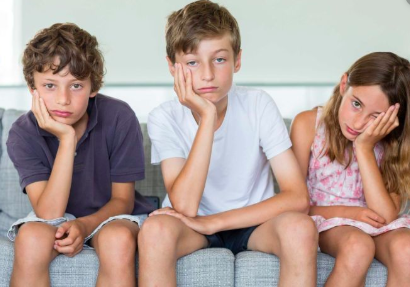Boredom in Children and Teens

These days it is very rare to hear of a child complaining that they’re bored. For many of us who are of parenting age, we can remember the dull sensation of feeling like there just wasn’t very much to do. But in this day and age, children and young people are literally bombarded with sensory data and different activities pulling their minds in hundreds of different directions, from one moment to the next. Whilst for many parents this can come as a blessing because they don’t have to deal with insistent complaint that there is nothing to do, at the same time it shows just how much of a change has happened in our culture and society.
When I was a child, Sunday afternoons were the time to get bored. I may have been visiting grandparents or other relatives where there just didn’t seem to be anything much of a child-friendly nature going on. Whilst at the time that boredom seemed to be like a form of torture, there were probably many lessons that came from going through that experience. Having the opportunity to become bored can teach a child how to be at one with themselves and their own thinking. It can cause them to tune in to the external environment and grow curious about what is going on in the world around them. Boredom can also offer children an opportunity to really stretch their creativity muscles, as they are forced to come up with their own ideas, games and events to amuse themselves.
However if I fast forward to now, and think about what happens when I take my children to visit their grandparents, rather than creating a set of circumstances where they are encouraged to experience the sensation of boredom and to develop those creative muscles because of it, I’ve instead noticed how easy it is to hand over an iPad or an iPhone to allow them to entertain themselves and sit there quietly whilst the adults are talking. Of course, the influence of the internet and technology on children is an intense conversation in itself, and probably one best saved for a whole other article. But my point in this instance is that children are easily distracted from the sensation of boredom by one of the many activities, games, toys or products that they have available to them.
Whilst this may seem beneficial in some circumstances, there are other implications that are not altogether positive. Aside from missing the opportunity to develop those creative muscles that encourage them to find other ways to amuse themselves (for example, building a rocket ship out of household objects), they’re also missing out on the opportunity to learn how to cope in times of struggle and stress. Boredom can also offer our mind an opportunity to be quiet and still to organise our thoughts or experiences that we’ve already had.
Without this, children and even adults can end up with a sense of being overwhelmed and feeling anxious without even realising how they came to be experiencing that state. You may notice that your child has a greater propensity to behave in erratic or hyperactive ways.
For example, children who suffer from the condition ADHD tend to want to find ways to be constantly engaged and involved, and to move from one activity to the next, and then the next. Because their desire and insistence to do so can be quite strong, parents and carers may find themselves entertaining that desire. Let’s just think about that for a moment. If you have a child who is hyperactive, should you be inclined to provide them with even more stimulus or would it be better to teach them ways to cope with fewer stimuli, and to learn how to calm their minds – how to be still within themselves from time to time?
At my therapy centre in Essex, I work with children and parents to develop strategies that can help you to uncover the reasons why there is an insistent need for stimulation. For those whose behaviour has tipped into the hyperactivity side of the spectrum, or who are finding it difficult to concentrate and hold their attention for any meaningful length of time, there are techniques that I can use that will help them to become more still, calm, and quiet internally. To find out more about the work that I do in and around Crays Hill, Billericay, Basildon, Wickford, Southend-on-sea, Chelmsford, Colchester and Brentwood, then please give me a call on 07958 203 274. Alternatively, you can drop me an email to my office!
By Gemma Bailey

Leave a Reply